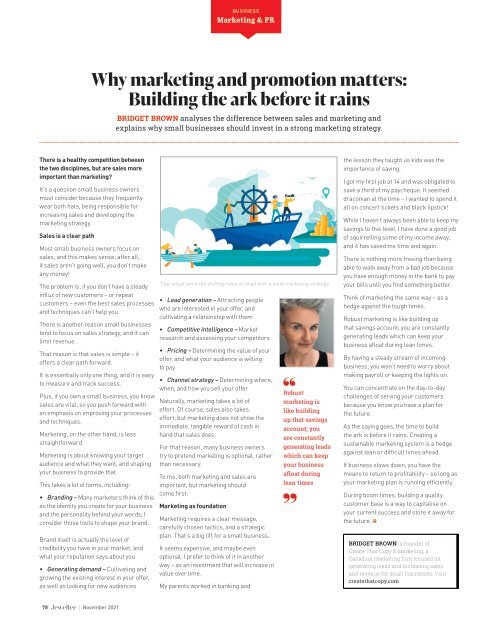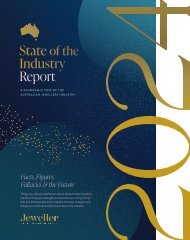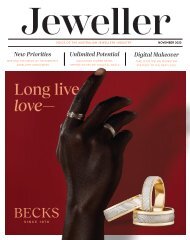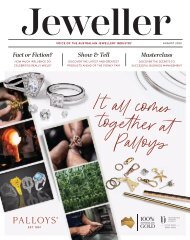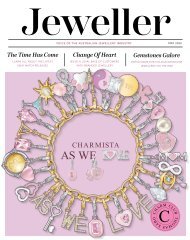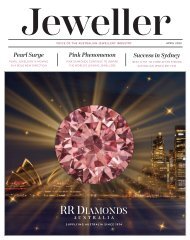Create successful ePaper yourself
Turn your PDF publications into a flip-book with our unique Google optimized e-Paper software.
BUSINESS<br />
Marketing & PR<br />
Why marketing and promotion matters:<br />
Building the ark before it rains<br />
BRIDGET BROWN analyses the difference between sales and marketing and<br />
explains why small businesses should invest in a strong marketing strategy.<br />
There is a healthy competition between<br />
the two disciplines, but are sales more<br />
important than marketing?<br />
It’s a question small business owners<br />
must consider because they frequently<br />
wear both hats, being responsible for<br />
increasing sales and developing the<br />
marketing strategy.<br />
Sales is a clear path<br />
Most small business owners focus on<br />
sales, and this makes sense; after all,<br />
if sales aren’t going well, you don’t make<br />
any money!<br />
The problem is, if you don’t have a steady<br />
influx of new customers – or repeat<br />
customers – even the best sales processes<br />
and techniques can’t help you.<br />
There is another reason small businesses<br />
tend to focus on sales strategy, and it can<br />
limit revenue.<br />
That reason is that sales is simple – it<br />
offers a clear path forward.<br />
It is essentially only one thing, and it is easy<br />
to measure and track success.<br />
Plus, if you own a small business, you know<br />
sales are vital, so you push forward with<br />
an emphasis on improving your processes<br />
and techniques.<br />
Marketing, on the other hand, is less<br />
straightforward.<br />
Marketing is about knowing your target<br />
audience and what they want, and shaping<br />
your business to provide that.<br />
This takes a lot of forms, including:<br />
• Branding – Many marketers think of this<br />
as the identity you create for your business<br />
and the personality behind your words; I<br />
consider those tools to shape your brand.<br />
Brand itself is actually the level of<br />
credibility you have in your market, and<br />
what your reputation says about you<br />
• Generating demand – Cultivating and<br />
growing the existing interest in your offer,<br />
as well as looking for new audiences<br />
Stay afloat amid the shifting tides of retail with a solid marketing strategy.<br />
• Lead generation – Attracting people<br />
who are interested in your offer, and<br />
cultivating a relationship with them<br />
• Competitive intelligence – Market<br />
research and assessing your competitors<br />
• Pricing – Determining the value of your<br />
offer, and what your audience is willing<br />
to pay<br />
• Channel strategy – Determining where,<br />
when, and how you sell your offer<br />
Naturally, marketing takes a lot of<br />
effort. Of course, sales also takes<br />
effort, but marketing does not show the<br />
immediate, tangible reward of cash in<br />
hand that sales does.<br />
For that reason, many business owners<br />
try to pretend marketing is optional, rather<br />
than necessary.<br />
To me, both marketing and sales are<br />
important, but marketing should<br />
come first.<br />
Marketing as foundation<br />
Marketing requires a clear message,<br />
carefully chosen tactics, and a strategic<br />
plan. That’s a big lift for a small business.<br />
It seems expensive, and maybe even<br />
optional. I prefer to think of it in another<br />
way – as an investment that will increase in<br />
value over time.<br />
My parents worked in banking and<br />
Robust<br />
marketing is<br />
like building<br />
up that savings<br />
account; you<br />
are constantly<br />
generating leads<br />
which can keep<br />
your business<br />
afloat during<br />
lean times<br />
the lesson they taught us kids was the<br />
importance of saving.<br />
I got my first job at 14 and was obligated to<br />
save a third of my paycheque. It seemed<br />
draconian at the time – I wanted to spend it<br />
all on concert tickets and black lipstick!<br />
While I haven’t always been able to keep my<br />
savings to this level, I have done a good job<br />
of squirrelling some of my income away,<br />
and it has saved me time and again.<br />
There is nothing more freeing than being<br />
able to walk away from a bad job because<br />
you have enough money in the bank to pay<br />
your bills until you find something better.<br />
Think of marketing the same way – as a<br />
hedge against the tough times.<br />
Robust marketing is like building up<br />
that savings account; you are constantly<br />
generating leads which can keep your<br />
business afloat during lean times.<br />
By having a steady stream of incoming<br />
business, you won’t need to worry about<br />
making payroll or keeping the lights on.<br />
You can concentrate on the day-to-day<br />
challenges of serving your customers<br />
because you know you have a plan for<br />
the future.<br />
As the saying goes, the time to build<br />
the ark is before it rains. Creating a<br />
sustainable marketing system is a hedge<br />
against lean or difficult times ahead.<br />
If business slows down, you have the<br />
means to return to profitability – so long as<br />
your marketing plan is running efficiently.<br />
During boom times, building a quality<br />
customer base is a way to capitalise on<br />
your current success and store it away for<br />
the future.<br />
BRIDGET BROWN is founder of<br />
Create That Copy & Marketing, a<br />
Canadian marketing firm focused on<br />
generating leads and increasing sales<br />
and revenue for small businesses. Visit:<br />
createthatcopy.com<br />
78 | <strong>November</strong> <strong>2021</strong>


